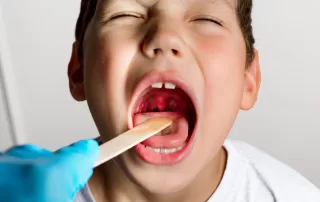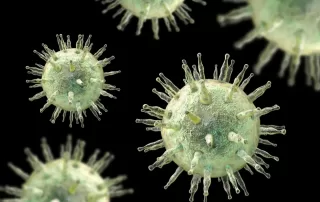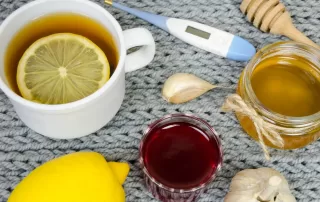Overview
A sore throat, or pharyngitis, involves pain, irritation, or scratchiness in the throat, often worsened by swallowing. It can be caused by infections, environmental factors, or irritants and affects individuals of all ages.
Symptoms:
- Pain or a scratchy sensation in the throat
- Difficulty swallowing
- Swollen, red tonsils
- White patches or pus on the tonsils
- Hoarse or muffled voice
- Swollen lymph nodes in the neck
- Fever and chills
- Cough
Causes:
- Viral Infections: The most common cause of sore throats, including colds, flu, and mononucleosis. Viruses cannot be treated with antibiotics.
- Bacterial Infections: Streptococcus pyogenes, the bacterium that causes strep throat, is a common bacterial cause. Bacterial infections may require antibiotics for treatment.
- Environmental Factors: Dry air, especially during winter, can dry out the throat, causing irritation. Exposure to smoke, chemicals, or other pollutants can also cause a sore throat.
- Allergies: Allergic reactions to pollen, dust, pet dander, and other allergens can lead to throat irritation.
- Irritants: Smoking or exposure to secondhand smoke, spicy foods, or alcohol can irritate the throat.
Diagnosis:
Diagnosis typically involves a physical examination of the throat and a review of symptoms. A rapid strep test or throat culture may be performed to determine if the infection is bacterial. Additional tests, such as blood tests, may be used to identify viral infections like mononucleosis.
Treatment:
- Viral Sore Throats- often resolve on their own within a week. Treatment focuses on relieving symptoms and may include:
- Rest and hydration
- Over-the-counter pain relievers such as paracetamol or ibuprofen
- Throat lozenges and sprays
- Warm saltwater gargles
- Bacterial Sore Throats – this may need to be treated with antibiotics. It’s important to complete the full course of antibiotics to prevent complications and ensure the infection is fully eradicated.
- Home Remedies: Include drinking warm liquids (tea with honey, broths), sucking on ice chips, and using a humidifier to keep the air moist.
Prevention:
- Practice good hygiene, such as frequent handwashing and avoiding close contact with infected individuals.
- Avoid sharing food, drinks, or utensils with others.
- Maintain a healthy lifestyle to support a strong immune system, including a balanced diet, regular exercise, and adequate sleep.
- Stay hydrated and avoid irritants like smoke and alcohol.
When to Seek Medical Attention:
- Symptoms last longer than a week or worsen
- Difficulty breathing or swallowing
- Severe pain that does not improve with over-the-counter pain relievers
- Signs of dehydration, such as reduced urine output or dizziness
- Presence of a rash or joint pain, which may indicate a more serious condition






